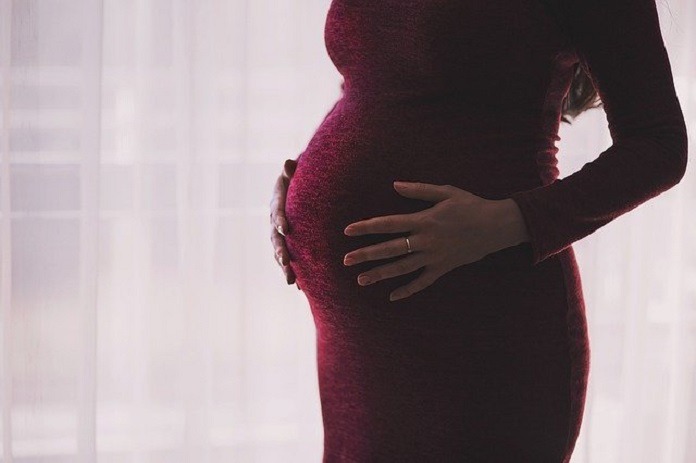Researchers in Sweden evaluated the effects of being pregnant during the COVID-19 pandemic.
In the scheme of monumental life changes, giving birth ranks towards the top of the list. New mothers often feel excitement and look forward to the day they meet their new baby. However, pregnancy can be a time of uncertainty for mothers-to-be. For first-time mothers, the responsibility of raising a child can be daunting. Add in the learning curve of caring for an infant, and worries can begin to mount up.
Pregnancy is also a time of vulnerability for the baby and mother (1). This vulnerability can be both physical and mental. While the physical changes accompanying motherhood can be uncomfortable, they are milestones marking the path towards birth. Even though the quality of life for mothers has been found to be lower than that of the general population, mothers often experience an increase in their mental quality of life during the course of the pregnancy (2).
It turns out that mental health issues are common during pregnancy (3). One study found there are several factors that can increase the likelihood of poor mental health (4). Factors include shift work, insufficient sleep, limited to no social support, and pregnancy-related worries (4).
Younger mothers are also at a higher risk to experience mental health issues during pregnancy (5). Depression, prior psychological distress, abuse, and poverty increase the chances of experiencing poor mental health during pregnancy (5).
Often, mental health assessment is not a part of routine maternal care in low and middle-income countries (6). Even in the UK, where specialist perinatal mental health services began being offered in 2016, expecting mothers experience depression and anxiety (3).
Poor mental health during pregnancy can cause higher stress hormones to be released (7). In turn, the baby can experience higher cortisol levels or changes to their internal organs (7). Unfortunately, these changes could cause the baby to be more likely to experience mental health problems as an adult (7).
The challenges mothers face to their mental health have increased since the COVID-19 pandemic. One study found that 57% of pregnant women experienced higher depression during the pandemic (8). The same study found expecting mothers’ worries were increased by 30%, and insomnia increased by 19%.
Common fears among pregnant women during the COVID-19 pandemic included fear of infecting loved ones, fear of harm to their infant, and an increased number of women wanting a C-section (9).
Unlike other nations, Sweden did not implement strict lock-down measures during the pandemic. Instead, Sweden recommended social distancing and staying home if citizens felt sick. Researchers from the University of Gothenburg in Goteborg, Sweden performed a study researching how pregnant women experienced pregnancy during the pandemic (10). The study results were published in the journal Women and Birth.
The study followed fourteen pregnant women who had not had COVID-19. The women gave birth between August 2020 to November 2020, so were all pregnant during the first and second waves of the pandemic.
Although Sweden did not implement lock-down measures, restrictions were still in place. The partners of the women were not allowed to attend maternal check-ups or ultrasounds. They were allowed in the delivery room but could not go in the maternity or postpartum wards.
The women were interviewed in-depth about their experience being pregnant during the pandemic. The interviews were recorded and transcribed so the researchers could study them in-depth.
Based on the interview, researchers derived five essential experiences of the women. These five essences were
- Dealing with uncertainties
- Information echo
- Socially isolated
- Maternity care without support
- Trust of maternal healthcare service
The study found that the COVID-19 pandemic was an ever-present shadow that led them to deal more intimately with the five essences than they might have otherwise. The researchers believe the results can help providers determine holistic healthcare services for women which consider not only physical well-being but mental well-being too.
References:
- Davis EP, Narayan AJ. Pregnancy as a period of risk, adaptation, and resilience for mothers and infants. Development and Psychopathology. 2020;32(5):1625-1639. doi:10.1017/s0954579420001121
- Lagadec N, Steinecker M, Kapassi A, et al. Factors influencing the quality of life of pregnant women: a systematic review. BMC Pregnancy and Childbirth. 2018;18(1). doi:10.1186/s12884-018-2087-4
- Howard LM, Khalifeh H. Perinatal mental health: a review of progress and challenges. World Psychiatry. 2020;19(3):313-327. doi:10.1002/wps.20769
- Sattler MC, Jelsma JGM, Bogaerts A, et al. Correlates of poor mental health in early pregnancy in obese European women. BMC Pregnancy and Childbirth. 2017;17(1). doi:10.1186/s12884-017-1595-y
- Lucas G, Olander EK, Ayers S, Salmon D. No straight lines – young women’s perceptions of their mental health and wellbeing during and after pregnancy: a systematic review and meta-ethnography. BMC Women’s Health. 2019;19(1). doi:10.1186/s12905-019-0848-5
- McCauley M, Brown A, Ofosu B, van den Broek N. “I just wish it becomes part of routine care”: healthcare providers’ knowledge, attitudes and perceptions of screening for maternal mental health during and after pregnancy: a qualitative study. BMC Psychiatry. 2019;19(1). doi:10.1186/s12888-019-2261-x
- Ulrich F, Petermann F. Consequences and Possible Predictors of Health-damaging Behaviors and Mental Health Problems in Pregnancy – A Review. Geburtshilfe und Frauenheilkunde. 2016;76(11):1136-1156. doi:10.1055/s-0042-118180
- Khoury JE, Atkinson L, Bennett T, Jack SM, Gonzalez A. COVID-19 and mental health during pregnancy: The importance of cognitive appraisal and social support. Journal of Affective Disorders. 2021;282:1161-1169. doi:10.1016/j.jad.2021.01.027
- Salehi L, Rahimzadeh M, Molaei E, Zaheri H, Esmaelzadeh‐Saeieh S. The relationship among fear and anxiety of COVID‐19, pregnancy experience, and mental health disorder in pregnant women: A structural equation model. Brain and Behavior. 2020;10(11). doi:10.1002/brb3.1835
- Linden K, Domgren N, Zaigham M, Sengpiel V, Andersson ME, Wessberg A. Being in the shadow of the unknown — Swedish women’s lived experiences of pregnancy during the COVID-19 pandemic, a phenomenological study. Women and Birth. Published online September 2021. doi:10.1016/j.wombi.2021.09.007
- Image by Pexels from Pixabay



